Filter by...
Reset all
Publications (341)
Book Chapter
– A global look at the first year of the pandemic
From the book:
How States Respond to Crisis
Book Chapter
– The undermining role of vertical health policies in health systems
From the book:
How States Respond to Crisis
Book Chapter
From the book:
How States Respond to Crisis
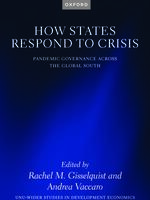
– Pandemic Governance Across the Global South
BOOK IN PRODUCTION | SCHEDULED FOR PUBLICATION FEBRUARY 2025We expect the state to matter in times of crisis to better provide for and protect their populations. But how is it, precisely, that the quality of the state matters? This book speaks to this question through comparative study of how...
Book Chapter
From the book:
How States Respond to Crisis

– Economic policies that could make a difference
Turmoil following presidential and parliamentary elections in Mozambique has been severe. Preliminary official results from the 2024 elections indicated a landslide win by the ruling party, Frelimo. These results are widely contested, with various reports of irregularities.Post-election squabbles...

Rising public debt in Africa, exacerbated by multiple shocks and limited fiscal space, poses a significant challenge to the region’s development. Half of the low-income countries in sub-Saharan Africa (SSA) are in debt distress or at high risk of it, as calls for international action, such as...

South Africa's unemployment rate stands at a staggering 32.1%—one of the highest in the world. Coupled with an alarming poverty rate, where nearly half of the population lives below the poverty line, the socioeconomic landscape is dire. Amidst these challenges, the special COVID-19 Social Relief of...
Journal Article
This peer-reviewed research is available free of charge. UNU-WIDER believes that research is a global public good and supports Open Access.
COVID-19 pandemic, household welfare and diversification strategies of smallholder farmers in Uganda
Agricultural activities in many sub-Saharan African (SSA) countries are subject to various risk factors that the COVID-19 compounds. Earlier studies on the effect of COVID-19 on smallholders neglect the issue of comparison with non-farm households. The study uses micro-level household datasets to...
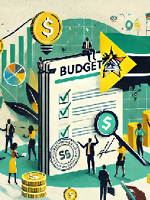
Mozambique ranks in the bottom 20 of the human development index, with nearly two-thirds of its population (18.9 million people) living below the USD 0.70-a-day national poverty line. Simultaneously, the country struggles to finance public spending and consistently runs state budget deficits...
Blog
In recent years, governments worldwide witnessed a surge in debt levels. According to the Institute of International Finance, global debt reached a staggering USD 315 trillion in early 2024, with sizable increases in emerging market countries. This increase in borrowing, at least by governments, was...
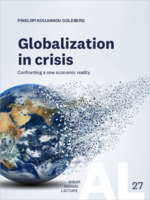
– Confronting a new economic reality
The 2023 Annual Lecture was delivered by Pinelopi (Penny) Goldberg. She spoke about her research on the topic of globalization.As the title of the lecture implies, this study is about globalization in crisis. Readers are no doubt aware that recent years have seen significant shifts in global...

– A guide for billionaires seeking impact
Where should billionaires spend their money if they want to make a positive difference? I spoke to the experts in our network and took a look at recent UN flagship reports to gain insights into this critical question.In 2021, Elon Musk made a claim on social media that he would sell Tesla shares to...
Journal Article
This peer-reviewed research is available free of charge. UNU-WIDER believes that research is a global public good and supports Open Access.
The study analyses trends in global income distribution since 1950 using a new companion WIID dataset with standardized country income percentiles. It investigate the robustness of these trends with respect to key data choices, as well as the degree to which the inequality trend depends on specific...
Working Paper
pdf
Sub-Saharan Africa (SSA)’s public debt burden remains a challenge to development. Key drivers of public debt include large-scale financing of infrastructure development, adverse impact of multiple shocks including COVID-19 pandemic, maturity mismatches, and high vulnerability to exchange rate and...
Book Chapter
This peer-reviewed research is available free of charge. UNU-WIDER believes that research is a global public good and supports Open Access.
From the book:
COVID-19 and the Informal Economy
Book Chapter
This peer-reviewed research is available free of charge. UNU-WIDER believes that research is a global public good and supports Open Access.
From the book:
COVID-19 and the Informal Economy
Book Chapter
This peer-reviewed research is available free of charge. UNU-WIDER believes that research is a global public good and supports Open Access.
From the book:
COVID-19 and the Informal Economy
Book Chapter
This peer-reviewed research is available free of charge. UNU-WIDER believes that research is a global public good and supports Open Access.
– Lessons from Relief for Comprehensive Social Protection
From the book:
COVID-19 and the Informal Economy
Book Chapter
This peer-reviewed research is available free of charge. UNU-WIDER believes that research is a global public good and supports Open Access.
– A Case of Domestic Workers in Delhi
From the book:
COVID-19 and the Informal Economy
Book Chapter
This peer-reviewed research is available free of charge. UNU-WIDER believes that research is a global public good and supports Open Access.
– Unpacking COVID-19 Impact on Livelihoods and Poverty in Rural Areas and Urban Low-Income Settlements of Bangladesh
From the book:
COVID-19 and the Informal Economy
Book Chapter
This peer-reviewed research is available free of charge. UNU-WIDER believes that research is a global public good and supports Open Access.
– Accounts from Residents of Cape Town’s Largest Township
From the book:
COVID-19 and the Informal Economy
Book Chapter
This peer-reviewed research is available free of charge. UNU-WIDER believes that research is a global public good and supports Open Access.
– Differentiated Impacts and an Uneven Recovery
From the book:
COVID-19 and the Informal Economy
Book Chapter
This peer-reviewed research is available free of charge. UNU-WIDER believes that research is a global public good and supports Open Access.
From the book:
COVID-19 and the Informal Economy
Book Chapter
This peer-reviewed research is available free of charge. UNU-WIDER believes that research is a global public good and supports Open Access.
– National labour surveys in five Latin American countries and field research in 11 cities around the world
From the book:
COVID-19 and the Informal Economy
Book Chapter
This peer-reviewed research is available free of charge. UNU-WIDER believes that research is a global public good and supports Open Access.
– Degrees and Pathways of Impact in 11 Cities around the World
From the book:
COVID-19 and the Informal Economy
Book Chapter
This peer-reviewed research is available free of charge. UNU-WIDER believes that research is a global public good and supports Open Access.
– COVID-19 and the Informal Sector
From the book:
COVID-19 and the Informal Economy
Blog
Uganda, with a fiscal deficit of 5.6% in 2023, has increasingly turned to local resources to make up for its revenue shortfall since the World Bank suspended its funding on 8 August 2023 over the country’s anti-homosexuality law. In early April 2024, traders in downtown Kampala protested against...
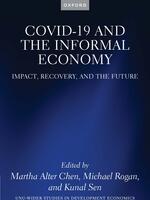
– Impact, Recovery and the Future
A key challenge for the post-COVID global economy is whether the disproportionate impact of the crisis on informal workers, who form the majority of the world’s workforce, will be acknowledged. Or whether harmful and negative stereotypes will persist.Today, despite the role of these essential...
Background Note
pdf
Over 60 years ago, Guy Orcutt and colleagues pioneered the use of microsimulation models in the social sciences to analyse the impact of social and economic policies. Although computational and data constraints initially hampered progress, these barriers were overcome and microsimulation modelling...
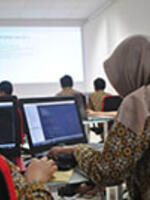
Our Institute’s expansive international research contributions, consisting of over 800 WIDER Working Papers in the 2019–23 work programme, delve deep into the development challenges the world faces. In the following country profiles, we pivot our focus towards Ecuador and Indonesia, serving as...
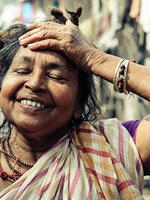
At UNU-WIDER, we undertake our work explicitly within the context of an emergent strategy designed to maximize the impact of our research findings. We operate based on a theory of change that outlines how research eventually translates into improved development outcomes for the world’s most...
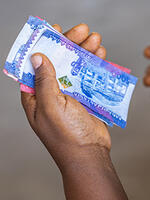
Sovereign Wealth Funds (SWFs) have become a symbol of national success and a means for global, commercial and geopolitical influence. But how well do they contribute to national development goals? Furthermore, global decarbonization threatens the future of many fossil fuel-financed SWFs. Here, we...
Book Chapter
This peer-reviewed research is available free of charge. UNU-WIDER believes that research is a global public good and supports Open Access.
From the book:
Sustaining Tanzania's Economic Development
Book Chapter
This peer-reviewed research is available free of charge. UNU-WIDER believes that research is a global public good and supports Open Access.
From the book:
Sustaining Tanzania's Economic Development
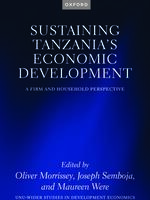
– A firm and household perspective
This book addresses performance and strategies adopted by firms and households in Tanzania to navigate shocks and achieve sustainability. How successful have firms and households been in building resilience to sustain their growth and development? Has the ability to navigate successfully through...
Working Paper
pdf
– Evidence from countermeasures in Germany
We study how the stringency of policy measures to counter the COVID-19 pandemic affects individuals’ trust in formal institutions. Drawing on micro-level panel data from Germany spanning an 18-month period from the onset of the pandemic, we show that, on average, there is a pronounced negative...
Journal Article
– Evidence from the COVID-19 pandemic in Mozambique
ARTICLE IS ON EARLY VIEW | Digital labour platforms have grown five-fold over the past decade, enabling significant expansion of gig work worldwide. We interrogate the critique that these platforms tend to amplify aggregate shocks for registered workers. Based on the universe of records from a...

Pursuing the global development agenda will require genuine commitment from political leaders and significant stepping-up of government efforts. But, above all, it will require increased financial resources. Where will these resources come from?We are at the mid-point of the 2030 Agenda for...
Blog
As we conclude the groundbreaking years of the 2019–2023 work programme on transforming economies, states, and societies, we reflect on the milestones achieved and anticipate the journey ahead.In 2019, I assumed the role of Director at UNU-WIDER and initiated the planning of the new work programme...
Working Paper
pdf
This paper studies the impact of the COVID-19 pandemic on formal sector employment in Uganda. Utilizing employee-level administrative tax data from the Uganda Revenue Authority, we describe the dynamics of employment as the pandemic evolved, seeking to better understand the various coping strategies...
Working Paper
pdf
– Simulation results for Zambia
The COVID-19 pandemic increased public debt and changed the income distribution in many countries. We use a numerical simulation approach to derive optimal nonlinear marginal tax rates for the pre-crisis and crisis periods. We contribute to the literature by examining optimal tax rates numerically...
Journal Article
– Insights from survey and tax administrative data in Zambia
THIS ARTICLE IS ON EARLY VIEW | This study examines how formal firms have been impacted by and recovered from the COVID-19 pandemic, by drawing on two distinct but complementary data sources. This is the first attempt to use both survey and tax administrative data to measure the impact of the...
Blog
Fragile and least developed countries have had their development assistance cut drastically, according to the Organisation for Economic Co-operation and Development. For instance, net official development assistance to sub-Saharan African countries has shrunk by 7.8% compared to 2021. And...
Blog
The South African constitution is considered progressive and transformative in intention due to its inclusion of socioeconomic rights, such as the right to education, food, and healthcare. However, some of these rights are qualified by the availability of state resources, which places an imperative...
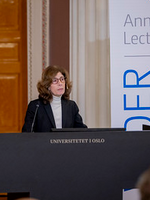
– Sobering insights from the 27th WIDER Annual Lecture
With several violent conflicts around the world weighing heavily on our minds, we attended the 27th WIDER Annual Lecture. Dr. Pinelopi Goldberg’s lecture on the potentially catastrophic consequences of a deglobalization movement are extremely relevant. In her lecture, titled ‘Globalization in crisis...
Blog
– New Projections of the UN Sustainable Development Goals
Today, October 17th is the UN International Day for the Eradication of Poverty (you already knew that, right?). In new analysis for UNU-WIDER, we assess progress towards the global poverty-related SDGs, specifically monetary poverty, undernutrition, child and maternal mortality, and access to clean...

Despite the rapid expansion of social protection across the Global South in recent decades, the ILO (2021: 19) estimates that more than half of the global population still have no access to any form of protection against poverty vulnerability and social exclusion. Globally, the share of aid that...

The 1980s are sometimes referred to as the ‘lost decade’ for development. Many countries in the Global South experienced weak or no improvement in poverty indicators. Our projections are equally dire for the current decade and prospects for the SDGs unless action is taken. We project a decade of...

The annual WIDER Development Conference held this year in Oslo concentrated on domestic revenue mobilization (DRM). The 2.5-day hybrid event emphasized both the progress made and unresolved problems in increasing economic autonomy and improving development prospects in the Global South.The...

Globalization is in retreat. Trade tensions between China and the United States are escalating, as illustrated by bans to the trade of semiconductor chips. The pandemic exacerbated an already difficult economic reality, raising new concerns about the resilience of global supply chains. Further...
Journal Article
This peer-reviewed research is available free of charge. UNU-WIDER believes that research is a global public good and supports Open Access.
– High poverty and low trust
As the COVID-19 pandemic unfolded, sub-Saharan African countries faced the dilemma of how to minimize viral transmission without adversely affecting the poor. This study proposes an index of lockdown readiness, taking into account housing conditions and income security, and analyses how this...
Working Paper
pdf
– A comparative perspective
We examine the distributional effects of the COVID-19 pandemic and associated tax-benefit measures in seven sub-Saharan African countries, focusing on the onset of the crisis.We evaluate impacts on disposable incomes, considering variations across income groups; assess the effectiveness of tax...
Working Paper
pdf
– New projections of the UN Sustainable Development Goals
In this paper, we present new projections for a range of global poverty-related Sustainable Development Goals (SDGs), specifically, extreme monetary poverty, undernutrition, stunting, child mortality, maternal mortality, and access to clean water and basic sanitation.Our projections, based on...
Working Paper
pdf
– An examination of the alleviating impact of tax and benefit measures
This paper investigates the impact of the COVID-19 pandemic and related tax-benefit measures in Viet Nam. The focus is on the initial phase of the crisis in 2020. The study delves into how the pandemic affected disposable incomes, examining the differences across the income distribution and impacts...
Blog
Data is the key to informed decision-making in today's rapidly changing world. As nations strive to address complex economic challenges, data-driven insights have become indispensable. South Africa is no exception, facing issues like declining GDP per capita, sluggish productivity growth, and rising...

– But not without some unintended results
About three years have passed since the South African government introduced the COVID-19 Temporary Employer-Employee Relief Scheme (TERS) in response to the pandemic and associated lockdown regulations. Given the extent of unemployment in South Africa even prior to the pandemic, the policy’s primary...
Working Paper
pdf
– Evidence from South Africa
Wage subsidies served as a dominant labour market policy response around the world to mitigate job losses in response to the COVID-19 pandemic. However, no causal evidence of their effects exists for developing countries.We use unique panel labour force survey data and exploit a temporary...
Working Paper
pdf
– Legacies of the Great Recession and the consequences of the ‘trust crisis’
This paper investigates how persistent changes in trust caused by the Great Recession have affected how governments and citizens across Europe responded to the next global crisis: the COVID-19 pandemic.We show that increases in individualism and mistrust towards institutions caused by individual...

– Research evidence for transforming economies, states, and societies
As we cross the mid-point of the 2030 Agenda for Sustainable Development, UNU-WIDER culminates a 5-year research programme on Transforming economies, states, and societies. The synthesis of the most salient research contributions made is organized in this report by three universal aspirations...
Blog
In celebration of South Africa's Women's Month, SA-TIED is spotlighting the women driving change within the field of economics. Through the ‘Breaking Barriers, Building Economies: Women in Economic Policy’ campaign, we highlight their achievements, challenges, and invaluable contributions. Carol...

The post-COVID-19 economic recovery and Russia’s war with Ukraine have caused some natural resource prices to reach new highs. Although forecasting the price of internationally-traded commodities is notoriously difficult, recent estimates suggest that prices will remain high through 2024. The high...
Working Paper
pdf
This study evaluates which type of benefit—a universal benefit, a proxy mean-tested benefit, or a categorical benefit— better cushions the poverty effects of income shocks in a developing economy. We compare the effectiveness of the three benefit schemes on poverty first conceptually and then by...
Blog
The rise of resilience policy in sustainable development Climate resilience is an increasingly popular response to development in a time of polycrisis or permacrisis. From the IPCC to the OECD, World Bank, and UNDP, the core notion of 'resilience' counters radical uncertainty and social-ecological...
Blog
Nearly half the working-age population and nearly two-thirds of the unemployed live in areas designated as townships under apartheid spatial laws. Originally developed as 'labour dormitories', they have been challenging to develop as more vibrant local economies and residential areas. What can the...
Journal Article
This peer-reviewed research is available free of charge. UNU-WIDER believes that research is a global public good and supports Open Access.
– Exploring a puzzling relationship in the early stages of the pandemic
During the first year of the COVID-19 pandemic, it was wealthier countries with stronger institutions that suffered the highest numbers of cases and fatalities. Many weaker countries were instead praised for more effective pandemic response. What explains this seeming puzzle? We re-consider these...
Working Paper
pdf
– Findings from national labour surveys in five Latin American countries
This paper provides a comparative summary of recent national statistics from five Latin American countries on employment losses and gains during the peak COVID-19 years compared with pre-pandemic levels. As part of its work on the impact of the pandemic on informal workers, the Women in Informal...
Working Paper
pdf
– Lessons from relief for comprehensive social protection
This paper considers the implications of COVID-19 relief measures for the building and extension of comprehensive and universal social protection systems. It highlights three key areas emerging from the crisis, which are likely to affect the shape of social protection systems moving forward. These...
Working Paper
pdf
Throughout 2021, fiscal stimulus packages were introduced to jump-start the COVID-19 ‘post-pandemic’ economic recovery process. While calls for economic recovery packages that promise to ‘build back better’ have come from many directions, the under-allocation of recovery resources directed at...
Working Paper
pdf
The current context of the COVID-19 pandemic has exposed the most vulnerable socio-economic groups to greater financial risk and thus could lead to exacerbating income inequality. The crisis creates an opportunity to demand further structural and systemic reforms for redistributive justice.Our paper...

Apart from a ‘badly flawed’ national election, insecurity, and mass exodus of its young talents to the Global North (locally known as Japa), a paralyzing debt burden is among the existential threats facing Nigeria, Africa’s largest and most populous economy. Between 1999—when democracy returned—and...
Blog
'Our window to avoid climate catastrophe is closing rapidly, and yet there are still many reasons for optimism.' This statement sums up a recent third event in a series that examines local and international progress towards the United Nation’s Sustainable Development Goals, held at Helsinki City...
Working Paper
pdf
– The sub-Saharan experience
COVID-19 cases were first confirmed in March 2020 in Ghana, Kenya, and South Africa. These countries put in place several stringent measures, including lockdowns, to contain the spread of the virus. Various policies were also rolled out to address the disruption in economic activities, to mitigate...

– Welcome to the three new Latin American teams
How would progressive income taxation affect income inequality in Bolivia? What are the costs and benefits of implementing a state pension in Colombia? Which social protection policies reduce income poverty in Peru? In addition to the nine pre-existing countries with their own tailored tax-benefit...

In Mozambique, Tanzania, South Africa, Uganda, and elsewhere, UNU-WIDER is on the ground to support national development plans, collect and create data for economic analysis and national and international policy processes, and build the capacity of government officials to develop national economies...
Working Paper
pdf
– Insights from Kenyan agricultural platforms
Women play a critical yet under-researched role in global digital agri-food value chains, especially in smallholder production, which affects how they are able to economically upgrade (improve crop yields and product quality, and increase product diversification). Research suggests that women’s...
Book Chapter
– Trends, policies, and controversies
Reducing poverty and inequality and promoting inclusive growth are fundamental to achieving the UN Sustainable Development Goals (SDGs), approved by the UN General Assembly in September 2015. The first target of SDG1 is to eradicate extreme poverty, while SDG10 focuses on reducing inequality within...
Journal Article
This peer-reviewed research is available free of charge. UNU-WIDER believes that research is a global public good and supports Open Access.
– Evidence from Ghana
In this study, we provide causal evidence of the immediate and near-term impact of stringent COVID-19 lockdown policies on employment outcomes, using Ghana as a case study. We take advantage of a specific policy setting, in which strict stay-at-home orders were issued and enforced in two spatially...
Blog
UK economic forecasts have improved markedly since the September 2022 mini-budget. The economic recession may now be more shallow and public borrowing lower than previously expected. However, faced with persistently high inflation and continued uncertainty caused by Russia’s war in Ukraine...
Working Paper
pdf
– COVID-19 and climate change
Terrorist and other types of armed groups often exploit natural and human-made disasters and emergencies to advance their causes. This paper studies how some armed groups have responded to two recent global emergencies—climate change and the COVID-19 pandemic. It examines the messaging and actions...
Blog
– UNU-WIDER Visiting PhD and Scholar programmes
Every year about 20 visitors come to Helsinki to find a new home at UNU-WIDER in our Visiting Scholars and PhD Fellowship programmes. Although their stay is only three months, the connections they make last much longer, with past visitors’ continued engagement through our research opportunities...
– A change in environment for a new perspective
After two years of COVID-19 restrictions, I was thrilled to receive an acceptance letter to UNU-WIDER's Visiting PhD Fellowship Programme. Until this point, most of my studies had been conducted online, so a change in environment seemed like a promising way to motivate me to push through my...

The importance of domestic revenue mobilization and taxation for sustainable development is widely acknowledged in global development discussions, but for real change to happen the amounts of development aid and political engagement need to live up to commitments.Key factors of development...
Blog
The toll of the COVID-19 pandemic is still being assessed. Meanwhile, new variants continue to threaten as the reservoir of infected people remains large enough for mutations to proliferate. Excess deaths, a global measure, are estimated at 14.9 million for 2020–21 by the World Health Organization...
Working Paper
pdf
– Investigating the effectiveness of COVID-19 aid in the Democratic Republic of the Congo
Drawing from a growing body of literature on development aid in fragile contexts, this paper investigates the effectiveness of COVID-19 aid in the Democratic Republic of the Congo (DRC). The paper uses the OECD’s Principles for Good International Engagement in Fragile States and Situations to...
Journal Article
This peer-reviewed research is available free of charge. UNU-WIDER believes that research is a global public good and supports Open Access.
– Livelihoods and wellbeing in India during COVID-19
This article studies the impact of the COVID-19 pandemic on the gendered dimensions of employment and mental health among urban informal-sector workers in Delhi, India.First, the study finds that men’s employment declined by 84 percentage points during the pandemic relative to pre-pandemic...
Journal Article
This peer-reviewed research is available free of charge. UNU-WIDER believes that research is a global public good and supports Open Access.
– A view from below
This paper investigates the impact of the COVID-19 pandemic and related policy measures on livelihoods in urban South Africa. Using qualitative research methods, we analyse two rounds of semi-structured phone interviews, conducted between June and September 2020 in the township of Khayelitsha, Cape...
Working Paper
pdf
– Lessons from more than two decades of research
The objective of this paper is to focus on fragility research findings and examine what works or does not work in development aid and development cooperation in fragile and conflict-affected contexts. We draw on our own research findings as well as country-level studies. We examine questions of aid...
Working Paper
pdf
– A rapid scoping review
In the wake of the COVID-19 pandemic, several countries enacted tax and social protection measures to help mitigate the economic hardship faced by individuals and households. This experience underscores the need to better understand the impact of such programmes on incomes and poverty during crises...
Working Paper
pdf
– Evidence from Ecuadorian administrative data
This paper aims to assess the extent to which top earners in Ecuador were affected by the COVID-19 crisis compared to other segments of the population.Our analysis uses administrative data for individuals affiliated to social security between January 2019 and December 2021. We identify the top 10, 1...
Blog
– Key findings from the IGM Annual Conference 2022
Since 2016, the private sector in Mozambique has faced several external shocks, including terrorism in Cabo Delgado, Cyclones Idai and Kenneth, the COVID-19 pandemic, and the Ukrainian conflict and its impact on commodity prices and inflation. What is the state of the Mozambican private sector today...

2022 is already a record-breaker in the number of climate change-related events, and developing countries must now pay for the repairs and remediation needed to combat the consequences. Although the international community pledged support at the UN Climate Conference (COP27), the costs of shoring up...

– Meet our tax-benefit microsimulation team in Rwanda!
How can Global South countries improve their tax and social protection systems? One way is to take advantage of tools that help assess the impact of different policies. Rwanda is the latest country to join the SOUTHMOD collaboration, which will enable UNU-WIDER and Rwanda Revenue Authority (RRA) to...

Simon Kuznets’ pipe dream was to have economic inequality data that rarely existed when he was writing. What are the pipe dreams of today’s development economists? How about a rigorous development economics book, or set of books, you could read in a spare hour or two? A book that provides an...
Journal Article
– Industrial aspirations and reverse labour migration
The COVID-19 pandemic has escalated processes of labour transition from industrial work to the informal economy, which have always characterized the life of the working poor. This study explores this kind of reverse transition, that is, when the Lewisian dream of having an industrial job comes to an...
Journal Article
This peer-reviewed research is available free of charge. UNU-WIDER believes that research is a global public good and supports Open Access.
– Evidence from Ecuador
By combining household survey data before and during the COVID-19 pandemic with detailed tax-benefit simulations, this paper quantifies the distributional effects of COVID-19 in Ecuador and the role of tax-benefit policies in mitigating the immediate impact of the economic shocks. Our results show a...
Working Paper
pdf
Informal self-employed traders in developing countries are vulnerable to shocks as they often lack access to social insurance or formal finance. This study investigates the impact of the COVID-19 pandemic on these urban traders in the capital of Mozambique, Maputo. Drawing on longitudinal phone...
Working Paper
pdf
This study investigates the short-term impacts of an aggregate socioeconomic shock on household food consumption and children’s nutrition using the case of the COVID-19 pandemic in Mozambique. In response to the economic downturn, households are expected to adjust their food choices both in terms of...
Working Paper
pdf
We analyse the social protection policy response to COVID-19 and its impact on household incomes in Uruguay during 2020 and 2021, based on static microsimulation methods. From the onset of the crisis, the Uruguayan government implemented adjustments to existing social protection policies as well as...
Working Paper
pdf
This study posits that pandemics should be regarded as complex, open-ended phenomena that cannot be reduced to biology and epidemiology. The research assesses Ghana’s effectiveness in governing the COVID-19 pandemic contrary to apocalyptic predictions. This paper critiques Ghana’s responses to the...
Working Paper
pdf
– Looking for opportunities to strengthen trust in government and tax compliance by analysing citizens' perception of governance
The COVID-19 pandemic showed that many developing countries could not respond effectively to crises due to their limited capacity to diversify their social protection responses. Social protection systems depend mainly on government tax revenue capacity. Raising domestic revenue still represents a...
Technical Note
pdf
This technical note describes how the 2015 Social Accounting Matrix (SAM) for Mozambique was updated. New Household Budget Survey data availability, changes in the economic structure as captured by the underlying Supply and Use Tables and National Accounts as well as the frequency of previous SAM...
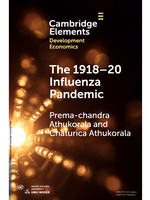
From the book:
The 1918–20 Influenza Pandemic

The influenza pandemic of 1918 (the Spanish Flu) is by far the greatest humanitarian disaster caused by an infectious disease in modern history. It infected over a quarter of the world’s population and killed over 50 million people. The brunt of the pandemic was borne by countries in the periphery...

– A Retrospective in the Time of COVID-19
The pandemic of 1918–20 — commonly known as the Spanish flu — infected over a quarter of the world's population and killed over fifty million people. It is by far the greatest humanitarian disaster caused by an infectious disease in modern history. Epidemiologists and health scientists often draw on...
Working Paper
pdf
– The political economy of compliance
This paper explores the link between trust in government, policy-making, and compliance. It focuses on a specific channel whereby citizens who are convinced that a policy is worthwhile are more motivated to comply with it. This in turn reduces the government’s cost of implementing a policy and may...
Working Paper
pdf
– Describing and explaining armed groups’ response to the pandemic in the Middle East
As COVID-19 spread worldwide, armed groups in control of territory were called to address the health emergency. However, our knowledge in this regard is limited. Specifically, it remains poorly understood why different armed groups responded to the crisis differently. Recognizing this lacuna, this...
Working Paper
pdf
– Exploring scalability through targeted versus universalist approaches
With the expansion of social protection measures due to the COVID-19 pandemic, considerations both old and new have surfaced regarding targeted versus universalist approaches. This study focuses on how social protection coverage before the pandemic influences the extent of targeted versus...
Working Paper
pdf
The COVID-19 pandemic drastically affected household incomes around the world. In developed economies, pre-pandemic tax–benefit policies and emergency transfers mitigated to a large extent the negative income shock. However, less is known about the effect of government intervention on household...
Working Paper
pdf
– Challenges and opportunities for sub-Saharan Africa
Effective domestic revenue mobilization has gained renewed urgency, especially in the light of the need to recover from the COVID-19 pandemic. In taxation debates, the ‘informal sectors’ have hitherto been assumed to be a part of the problem and implicitly mistaken for lucrative tax bases. First, I...
Blog
Early in October 2022, international and Colombian researchers gathered together for three days at the UNIANDES campus, located at the foot of the impressive Monserrate in Bogotá, Colombia. They were there to discuss their latest advances in inequality research. This was the second WIDER Development...
Blog
In response to the COVID-19 pandemic, governments financed more than 5000 fiscal support policies worldwide in 2020–21. The pandemic response is an example of how governments react to a major covariate shock —an often unforeseen shock with adverse effects on populations and major consequences for...
Blog
For several decades, UNU-WIDER has actively worked on pathfinding and groundbreaking research on inequalities. We host one of the most extensive collections of income inequality statistics in the world freely available and updated annually. I have written previously about how the institute was...
Blog
Developing countries will be predominantly urban by 2030. While urbanization is historically associated with development and broad-based social mobility, its effects on social mobility in cities of the Global South are more variable and less uniformly optimistic. Improving lives for the urban poor...
Blog
Russia’s war in Ukraine may reach a stalemate as neither side appears in reach of a military victory. Unless a settlement can be agreed, a frozen conflict may emerge, which will delay economic recovery in Ukraine. This will also extend the cost of living crisis around the world. In February 2022...
Working Paper
pdf
Agricultural activities in many African countries are bedevilled by a range of risk factors. Using micro-level household datasets from a range of countries in Africa, we examine the drivers of agricultural risks, while exploring the role of context as well as the impact of the COVID-19 pandemic on...
Working Paper
pdf
– Evidence from South Africa during the COVID-19 pandemic
Wage subsidies have served as a primary labour market policy used around the world to mitigate job losses in response to the COVID-19 pandemic. In South Africa, where unemployment is among the highest globally, the Temporary Employer–Employee Relief Scheme supported millions of workers in a far...

– One of the best global training programmes in tax research
Across Africa, governments are now waking up to the fact that taxation targets or economic development goals will not be met without policies that are based on scientific evidence. More effective revenue collection is required to achieve broad-based growth and fiscal sustainability. This paradigm...
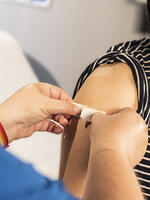
Government responsiveness is an integral feature of representative democracy. Its importance could be amplified in times of crisis, especially if citizens cannot rely on market actors for help. Governments can soften the impacts of negative shocks to the status quo, or exponentiate them by their...
Blog
– Experimental evidence from Mozambique
Digital technologies can be deployed to improve job search, but their effectiveness in practice is disrupted. This column uses experimental data to investigate the effect of a digital job-matching platform on the labour outcomes of young people in Mozambique. The ‘treatment’ of a text message...
Working Paper
pdf
– Evidence from Viet Nam
In view of the detrimental effect of COVID-19 lockdowns on household welfare, most countries implemented economic stimulus aid packages to support households. The extent to which these packages mitigated the pandemic’s adverse effects on households is not just an intriguing question for researchers...
Working Paper
pdf
– A case of domestic workers in Delhi
Studies on the impact of the COVID-19 pandemic have demonstrated that poor women have been the worst sufferers in terms of pay cuts and job losses. Women are the hardest hit also at the household level. They have to bear the brunt of constrained household budgets and have also encountered increasing...
Working Paper
pdf
– Evidence from COVID-19
Digital labour platforms have grown five-fold over the last decade, enabling significant expansion in gig work worldwide. We interrogate the criticism that these platforms tend to amplify aggregate economic shocks for registered users (workers). Based on the universe of records from a matching...
Working Paper
pdf
We investigate the impact of the COVID-19 pandemic on income levels, poverty, and inequality in both the immediate aftermath and during the uneven recovery until December 2021 using high-frequency household survey data from India. We find that the average household incomes dropped sharply during the...
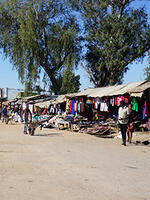
– Evidence from tax administrative and survey data in Zambia
Like most other countries, the government of Zambia introduced restrictions to control COVID-19, which considerably curtailed normal economic activity. A new WIDER and World Bank working paper, a multi-institutional collaboration of UNU-WIDER, the World Bank, the Zambia Revenue Authority and the...

African countries raise lower amounts of tax as a share of national income (GDP) than other countries. Researchers are interested in understanding why this is the case.Tax performance studies —statistical analyses of factors driving the tax-to-GDP ratio— mainly focus on economic features. For...
Blog
A few months ago, I was asked to deliver a lecture at the Vienna Institute for International Economic Studies on the UNU-WIDER Government Revenue Dataset (GRD). The GRD is the most complete source of cross-country government tax and revenue data, with the newly updated version covering over 40 years...
Working Paper
pdf
– From ad hoc to durable solutions?
This study provides a first attempt to contribute a large-scale assessment of whether crisis response as observed during the COVID-19 pandemic can serve as a feasible blueprint for creating durable solutions across countries. Adopting a lens on fiscal contracts, it assesses high-level parameters of...
Working Paper
pdf
– Evidence from a survey experiment in urban Ethiopia
The paucity of reliable, timely household consumption data in many low- and middle-income countries has made it difficult to assess how global poverty has evolved during the COVID-19 pandemic. Standard poverty measurement requires collecting household consumption data, which is rarely done by phone...
Working Paper
pdf
Previous economic downturns such as the 2008–09 Global Financial Crisis disproportionately affected male employment due to greater contractions in industries typically filled by men (e.g., manufacturing). However, after the imposition of the ‘hard’ COVID-19 lockdown between 2020 quarter 1 and 2 in...
Working Paper
pdf
– Interrogating capacity and response to COVID-19 in West Bengal
COVID-19 has brought to the fore the issue of state preparedness in mitigating health emergencies. This paper problematizes the received wisdom of greater state capacity in mitigating the severity of the pandemic. Based on a case study of West Bengal, a subnational state of India, it shows that...
Working Paper
pdf
– Do structural reforms matter?
While the negative effects of the 2008 global financial crisis on labour productivity are still fresh in people’s minds, the COVID-19 pandemic raises concerns that productivity will continue to decline. To boost labour productivity and regain economic performance, there is an empirical consensus on...
Blog
According to the World Bank, Indonesia has reached the upper-middle income status in 2019 after spending almost two decades in the lower-middle income country group. Despite the setback of COVID-19 the Indonesian government aspires to become a ‘developed’ country by 2045, when the country will...
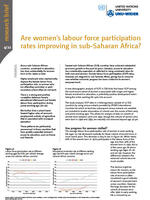
Several sub-Saharan African (SSA) countries have achieved substantial economic growth in the past 30 years. Likewise, access to education has considerably expanded, as reflected in rising enrolment rates for both men and women. Female labour force participation (FLFP) rates, however, are stagnant in...
Working Paper
pdf
– The role of evidence-based governance and structural violence
Why does a state like Peru, dedicated to fulfilling development goals and sustained good macroeconomic performance, appear incapable of dealing with the COVID-19 pandemic? Using the case of maternal mortality, this paper argues that the tremendous impact of the pandemic is rooted in the adoption of...
Working Paper
pdf
– Estimating the impact of pandemic job loss on poverty in South Africa
Up-to-date, nationally representative household income/expenditure data are crucial to estimating poverty during the COVID-19 pandemic and to policy-making more broadly, but South Africa lacks such data. We present new pandemic poverty estimates, simulating incomes in pre-pandemic household surveys...
Blog
In this blog, the managing editor of the WIDERAngle shares his personal view on some of the most important —and potentially overlooked— work recently released in the WIDER Working Paper Series. We just passed the halfway point of 2022 and, as of this writing, UNU-WIDER has already released 70...
Working Paper
pdf
– Insights from survey and tax administrative data in Zambia
This paper examines how formal firms have been impacted by and recovered from the pandemic by drawing on two distinct but complementary data sources. This is the first attempt to use both survey and tax administrative data to measure the initial decline and subsequent recovery of firm sales and...
Working Paper
pdf
Tanzania has experienced relatively strong and stable economic growth accompanied by social stability over the past two decades. The country is also pursuing an ambitious development plan with significant employment objectives. For development to be fully inclusive, specific attention must be paid...
Working Paper
pdf
– Strongman leadership, weak state capacity, and the politics of deployment in the Philippines
The outbreak of the COVID-19 pandemic undermined the populist legacy of Philippine president Rodrigo R. Duterte. Despite implementing one of the longest and strictest lockdowns globally, the country has struggled with controlling the pandemic. While Duterte looks to have triumphed in his attack on...
Working Paper
pdf
– Evidence from Viet Nam
Government effectiveness has played an important role in tackling the crisis caused by the coronavirus (COVID-19) pandemic. This paper discusses the different aspects of government effectiveness in explaining the variation in the COVID-19 confirmed cases and death levels in Viet Nam. We use the...
Working Paper
pdf
– Uttar Pradesh’s response to the COVID-19 pandemic
A rich and growing literature illustrates the paradox of COVID-19 responses by governments across the world. States with higher levels of authority and capacity have struggled to respond effectively to COVID-19, while states with low capacity and authority have been more effective in containing the...
Working Paper
pdf
During the first wave of COVID-19 infections, Kerala, a state in southern India, successfully managed to contain the pandemic. As a result, the Kerala model of managing the COVID-19 pandemic was celebrated as a success across the globe. However, at the time of writing, it looks like the celebrations...

– Meet our tax-benefit microsimulation team in Viet Nam!
How can Vietnamese policymakers improve their policy choices related to social protection and tax policies? Who are the experts providing evidence on different policy scenarios and their pros and cons to local decision makers? Meet our SOUTHMOD national team working in Hanoi who are leading the...
Journal Article
This peer-reviewed research is available free of charge. UNU-WIDER believes that research is a global public good and supports Open Access.
This study assesses the impact of COVID-19 on household consumption poverty. To predict changes in income and the associated effects on poverty, we rely on existing estimated macroeconomic impacts. We assume two main impact channels: direct income/wage and employment losses. Our simulations suggest...
Journal Article
This peer-reviewed research is available free of charge. UNU-WIDER believes that research is a global public good and supports Open Access.
– A social accounting matrix approach
This study assesses the economic costs of COVID-19 and the state of emergency implemented by the Government of Mozambique. We use a social accounting matrix multiplier analysis to estimate the effects of the pandemic on the economy. Our simulations suggest that the Mozambican economy lost 3.6...
Working Paper
pdf
On 10 March 2020, the Bolivian government identified two COVID-19 cases in Bolivians returning from Italy. The national government responded swiftly and sent the country into one of the world’s strictest lockdowns on 22 March 2020. However, low state capacity and low government legitimacy snarled up...
Working Paper
pdf
This paper presents a critical analysis of official data related to COVID-19 in Bihar state, India, which points to the manipulation of data for political ends. The ruling party’s claim that the state managed the COVID pandemic brilliantly seems more politically motivated than scientific. We show...
Working Paper
pdf
This paper makes the case that current social contracts are often inadequate, irrelevant, or unjust for informal workers. It outlines three possible future scenarios: the bad old contract, an even worse contract, and a better new contract.Under the bad old contract, informal workers lacked legal...
Working Paper
pdf
– Interrogating state capacity and its fault lines
The state of Maharashtra and the city of Mumbai have been referred to as the epidemic epicentre of India since the time of the plague of 1896 and influenza epidemic of 1918. During the COVID-19 pandemic too, the state experienced the highest cases with maximum fatalities. Against the structural...
Technical Note
pdf
This note describes methods to derive employment-to-unemployment transition shares across industries during the COVID-19 pandemic and to use these shares in SOUTHMOD tax-benefit microsimulation models to adjust relevant labour market variables. The first method entails the derivation of industry...

The price and availability of energy is fundamental to the health of the global economy. The Russia–Ukraine war is intensifying an energy shock that began unfolding as the prices for oil, natural gas and coal started to recover from a COVID-19-induced slump. Energy importers among the low-income...
Working Paper
pdf
– Degrees and pathways of impact in 11 cities around the world
This paper presents findings from two rounds (2020 and 2021) of a study on the impact of the COVID-19 crisis on informal workers in 11 cities across five regions of the world (Africa, Asia, Eastern Europe, Latin America, and North America). The study, carried out by the WIEGO network in partnership...
Working Paper
pdf
On the whole, poor countries in Africa and elsewhere seem to have weathered the coronavirus (SARS-CoV-2, or COVID-19) pandemic better than wealthier countries with superior healthcare systems. Using the Ghanaian case, this paper draws on newspaper articles, policy statements, and other secondary...
Working Paper
pdf
Reducing poverty and inequality and promoting inclusive growth are fundamental to achieving the United Nations Sustainable Development Goals. Much has changed in the global economy in recent decades and perspectives on progress made vary widely. This is even more so in light of the ongoing COVID-19...
Working Paper
pdf
Unlike Latin American peers, and contrary to World Health Organization recommendations, Nicaragua eschewed lockdowns and other common strategies to mitigate the spread of COVID-19. Analysts have since demonstrated how Nicaraguan authorities dramatically under-reported the number of deaths and...
Working Paper
pdf
– A stalled recovery
This paper seeks to identify the differentiated impacts of the crisis on specific groups of informal workers. The analysis draws on official nationally representative labour force surveys collected quarterly by South Africa’s national statistical agency (Statistics South Africa). Based on an...
Background Note
pdf
IntroductionThe South African youth wage subsidy started in 2014 to increase employment and create jobs for low-wage youth. The subsidy was temporarily raised in value and expanded to reach more workers due to the COVID-19 pandemic. During the lockdown period, the government used the subsidy to curb...
Blog
Global Inequality 101: Global inequality is the distribution of income across all people on the planet from the poorest to the richest. It can be measured with the ‘Gini’ which ranges from 1 (a totally unequal planet or one person gets everything) to 0 (a totally equal planet). Global inequality...
Blog
The time limit to reach the goals of the 2030 Agenda is now just eight years away. It is vital to pursue a new model of partnerships, based on coordinated responses, if we are to reach our international commitments and reduce inequality for all by building sustainable, inclusive and resilient...

Russia’s invasion of Ukraine has led to the disruption, by sanctions or war, of two of the world’s largest grain exporters. This means 2022 is shaping up to be a very difficult year for the global food system. Yet there were concerns that this system was creaking at the seams as far back as 2007. At...
Blog
The Omicron variant resulted in a third major wave of Covid-19 in India, with the number of cases exceeding those in the second wave, albeit causing less severe illness on average. In this post, Kundu and Gisselquist draw on several nationally representative data sources to illuminate key Covid-19...

The year 2021 marked the mid-point of UNU-WIDER’s 2019-2023 work programme addressing the three challenges of transforming economies, states, and societies. The COVID-19 pandemic meant that UNU-WIDER, along with most of the world, had to drastically change its ways of working. However, the Institute...

The first of the Sustainable Development Goals (SDGs) is to end poverty in all its forms, everywhere. The monumental task — a long-time dream of humanity — is followed by 16 more goals under the 2030 Agenda. Though they are all interlinked, to even contemplate their achievement requires a deep well...

The COVID-19 crisis — the pandemic, restrictions, and recession — has not been a grand leveler. While all of us, rich and poor, faced the fear and uncertainty of the virus, the crisis has exposed and amplified pre-existing inequalities, injustices, and insecurities. Depending on their positionality...
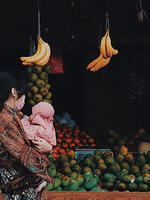
In the late 1950s, the United Nations System of National Accounts was set up to promote the collection of internationally comparable data on productive activity in different countries. The aim was to provide the basis for policy-making, including estimating the gross national product (GNP), the main...

– External support and insurgency tactics
The Ukrainian state, personified by its President Volodymyr Zelenskyy, has been heroic and has surprised many by its 'stiff resistance'. However, Ukrainian cities are increasingly under siege and Russia is sending in reinforcements. Just days into the invasion, Russia is ramping up the bombing of...
Working Paper
pdf
While the short-term effects of the COVID-19 pandemic on lives and livelihoods are well understood, we know little about the effect of the pandemic for longer-term outcomes such as corruption. We look at the historical data on political and economic crises to assess what we can learn from the long...
Working Paper
pdf
– Why low capacity, discursive legitimacy, and twilight authority matter
Tanzania received significant global attention for its COVID-19 response during the first year of the pandemic. It did not share pandemic statistics, require masks, implement lockdowns, or close borders; it questioned testing and vaccine efficacy; and it emphasized traditional medicines as a cure...

– Are moderate increases more sustainable?
Domestic revenue mobilization (DRM) — the generation of government revenue from domestic tax and non-tax resources — plays a crucial role in building an enduring financing architecture for sustainable development. This brief summarizes the dynamics of DRM trends across the past four decades...
Blog
– Does moderate outlast rapid growth in domestic revenue?
The past four decades have seen marked improvements in the collection of domestic revenue (tax and non-tax revenues) in many countries of the Global South. Domestic revenue mobilization (DRM) is a crucial steppingstone for meeting development needs: the costs of achieving the Sustainable Development...
Working Paper
pdf
The social and economic impact of COVID-19 has been deep, wide-ranging, and multi-dimensional. While anecdotal evidence of distress among the poor, particularly those with informal occupations, has been widespread, effective policy response has required real-time, researched data disaggregated for...

– And how to deal with them
Children from poorer families in Kenya, Tanzania, and Uganda face a double disadvantage in their opportunity to access learning: not only is the overall quality of education low in these countries, but they also attend relatively poorer-quality schools. This column reports new evidence on how...
Blog
– My experience in an online cohort of visiting PhD Fellows
Everyone that has been engaged in a PhD experience agrees that the whole process is a tough and sometimes lonely challenge. However, the visiting PhD fellowship at UNU-WIDER equipped me with additional discussions, guidance and networks needed to overcome these challenges. If you are now starting...

Millions of Africans lost their jobs as a result of the coronavirus pandemic, but state social security systems were of little help to people who lost their income.This is the conclusion of a study conducted by the United Nations University World Institute for Development Economics Research, UNU...
Journal Article
This peer-reviewed research is available free of charge. UNU-WIDER believes that research is a global public good and supports Open Access.
– A political economy of overoptimism
The contribution of this study is to question the ‘official’ estimates of global monetary poverty up to and during the COVID-19 pandemic. We argue there is a political economy of overoptimism in the measurement of global poverty. Specifically, we show that the methodological and presentational...

– Three key questions for understanding shifts in global poverty
In 2010 and the following years, there was attention to the fact that much of global poverty had shifted to middle-income countries (for example here, here, and here). The world’s poor hadn’t moved of course, but the countries that are home to large numbers of poor people had got better off on...
Journal Article
This peer-reviewed research is available free of charge. UNU-WIDER believes that research is a global public good and supports Open Access.
– Insights from the Hrishipara diaries
We examine the impact of the COVID-19 pandemic on the livelihoods of the poor in a semi-rural setting in Bangladesh. We use an unusually rich dataset which tracks the economic and financial transactions of sixty poor and very poor individuals and their families on a daily real-time basis for 12...
Working Paper
pdf
We examine the impact of the COVID-19 pandemic on Kenya’s foreign trade using quarterly trade data for the period 2019 to the second quarter of 2021. The exploratory analysis shows that growth of Kenya’s merchandise exports remained resilient, largely supported by traditional exports of tea and...
Book
Esta obra ofrece un análisis del sistema monetario internacional y de las reformas que es necesario emprender para que cumpla el papel activo en el siglo XXI. arte del diagnóstico según el cual no existe un sistema coherente, sino un ordenamiento ad hoc: el “no sistema” (término de viejas raíces)...
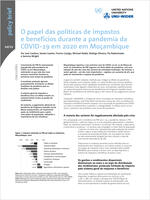
Moçambique reportou o seu primeiro caso da COVID-19 em 22 de Março de 2020. As estimativas do PIB sugerem um forte efeito da pandemia, com uma redução de sete dos nove dos sectores de actividade analisados. No entanto, o sector agrícola – um dos mais importantes – registou um aumento de 9%, que pode...

The COVID-19 pandemic has shown that African tax and social-benefit systems are currently ill-equipped to protect households from sudden income losses. Meaningful progress will require policymakers to reduce the size of the informal sector and improve the design and financing of social-protection...
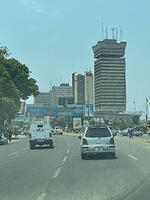
– New perspectives on travelling for research
Working for an international organisation presents a host of challenges, given the vast nature of tasks that one must surmount in a fast paced and changing environment. It might be a roller coaster, but also satisfying by providing many worthwhile experiences. The latter was my sensation during my...

– How five African countries fared
The number of people living in poverty around the world is estimated to have increased by half a billion people due to the COVID-19 crisis. The African continent has suffered at least US$100 billion in economic costs in 2020, measured by the reduction in trade revenues and financial flows due to the...
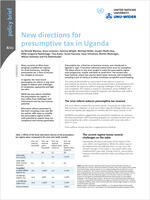
Presumptive tax, a final tax on business income, was introduced in Uganda in 1997. It has been reformed several times since its conception. The latest reform in July 2020 sought to make the presumptive regime more progressive, simpler and fairer to small firms. The revised rates have however raised...
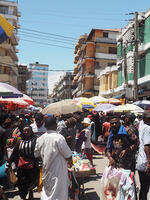
– Evidence from risk-based tax examinations
Risk-based approaches are becoming commonplace for tax authorities as a tool for enforcement. Improvements in technology, technological adoption and in some cases machine learning, hold great promise for finding the taxpayers who are most likely to avoid taxes, thus improving the detection of non...
Blog
How do crises such as the COVID-19 pandemic influence inequality and the other way around? This year’s UN Day Dresden put a spotlight on “Inequalities in Crises”. In an interview, we got up close and personal with our keynote speaker Dr Pia Rattenhuber (UNU-WIDER), an expert in development economics...
Working Paper
pdf
With data from the World Bank Enterprise Survey, this paper examines how firm-level resilience capabilities interact with government support in the reduction of lay-offs among formal firms in Central America. We estimate two latent variables to approximate resilience-related capabilities before...
Working Paper
pdf
We use a fiscal incidence model based on the South African 2014/15 Living Conditions Survey to simulate the poverty reduction impacts of a selection of medium-to-long-term social grant options with the goal of replacing the existing special COVID-19 Social Relief of Distress grant upon its expiry...
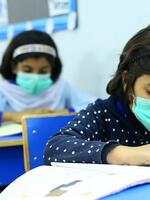
On the third day of the annual UNU-WIDER Conference on 8 September, RISE presented findings from three studies on COVID-19's impact on education systems. These studies underline the urgent need to remediate learning losses, but they also illustrate how systems can ‘build back better’. RISE’s panel...

– Four suggestions to tackle them
This month we had the honour to co-host the first ever LDC Future Forum here in Helsinki. It was our first large-scale live event since the COVID-19 pandemic hit, which made it particularly exciting to be involved in. The conference introduced science-based solutions for attaining the Sustainable...
Blog
Virgi Agita Sari joined UNU-WIDER as a visiting PhD fellow in the summer of 2017. Coming from Indonesia, Virgi joined five other fellows from across the globe. Upon completing the three-month fellowship, she returned to the University of Manchester to finish her PhD in Development Policy. In 2019...

The next decade is a make-or-break for the world’s most vulnerable countries. To tackle the unprecedented confluence of COVID-19, climate, and economic crises, new solutions are desperately needed. Scientific research is one key for finding long-lasting solutions. Least developed countries (LDCs)...

At the 76th Session of the United Nations General Assembly, world leaders discussed the need to scale-up ambition to address key global challenges, including the COVID-19 pandemic, climate change, political extremism, and widening inequality. With less than two weeks to go before the COP26 Climate...

The long-awaited COP26 in Glasgow is about to start. Billed as the most important COP to date, it is widely seen as a last chance to avoid a global temperature rise beyond 1.5°C. Yet expectations of major breakthroughs weaken by the week. Climate funding to help the developing world remains...

Tanzania, similar to most sub-Saharan countries, reported its first COVID-19 cases in March 2020. While GDP estimates suggest that the economy was less hard hit than in other African countries, some sectors have nevertheless experienced negative growth. Even with contained GDP contractions in 2020...

Around the world, the pandemic, and the measures taken to address it, have had far reaching effects on poverty, inequality, and governance. And even as the need for global action has increased, many wealthy countries have turned inwards — with closed borders, stockpiling of vaccines, and...
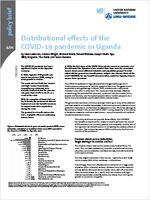
In 2020, the first wave of the COVID-19 pandemic caused an economic crisis that disrupted the Ugandan labour market. How large were the associated income losses across different industries and population groups? To what extent did the general tax-benefit system mitigate the adverse effects of the...

The first cases of COVID-19 in sub-Saharan Africa were reported in March 2020, and the impact of the pandemic has since rippled through the world and Africa. In response to the crisis and similarly to many of its peers, Ghana has enacted a variety of containment measures to confront the pandemic...

Mozambique reported its first case of COVID-19 on 22 March 2020. GDP estimates suggest a strong pandemic effect, with a reduction in seven of nine business sectors analysed. However, the agriculture sector, one of the most important, experienced a 9% increase, which may have cushioned the pandemic...

In summer 2020 the SOUTHMOD team set out, with partners, to analyse the impact of government policies on protecting households from getting poorer and avoiding societies from becoming more unequal. Now we are releasing a cross-country comparative study that analyses the distributional effects of the...

Zambia’s economic growth has been flattening over the past decade. In 2020 economic prospects further worsened, following the onset of the pandemic, rising debt, and the Eurobond default. In this unprecedented scenario, there is the need to examine impacts on welfare and the mitigation role taxes...
Displaying 208 of 341 results
 Join the network
Join the network